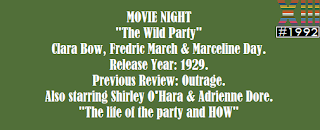Cast:
Clara Bow (Stella Ames), Fredric March (James 'Gil' Gilmore), Marceline Day (Faith Morgan), Shirley O'Hara (Helen Owens), Adrienne Dore (Babs), Joyce Compton (Eva Tutt), Jack Oakie (Al), Jack Luden (George), and Phillips Holmes (Phil) Directed by Dorothy Arzner (#1648 - Sarah and Son and #1810 - Working Girls)
Review:
There are three things to note with this film: it is the earliest surviving film in the career of Dorothy Arzner, as each of her first four works (Fashions for Women (1927), Ten Modern Commandments (1927), Get Your Man (1927), Manhattan Cocktail (1928)) are lost, save for select parts in two of the four. It is also the first "talkie" film featuring the Brooklyn native Clara Bow, who was considered the "it girl" of the 1920s, specifically within silent films. The 1930s would bring more sound films than silents, but Bow (never a fan of the sound process despite receiving reasonable reviews) appeared in just ten more films before retiring in 1933. Malcolm St. Clair was originally slated to be director for the film, but disagreements with Paramount led to the hiring of Arzner, who had directed Bow earlier with Get Your Man. It is also one of the first starring roles for Fredric March, who had been appearing in small roles for various years (while making his Broadway debut in 1926) before making his star turn in films such as this, which was the first of four appearances in an Arzner film. For theaters without sound capabilities, a silent version was constructed (this is also the case for Bow's next film in 1929 with The Saturday Night Kid). There were various writers involved: Samuel Hopkins Adams, known as an investigative writer, wrote the story under the pseudonym Warner Fabian (he also wrote a handful of novels featuring young women in the Jazz Age). E. Lloyd Sheldon was credited with "adaptation", while George Marion Jr and Sheldon wrote the titles and John V.A. Weaver was left uncredited. Apparently Bow was quite nervous when it came to filming in sound, to the point where a microphone exploded on the first day of filming. To help Bow out, Arzner tied a microphone in a fishpole, which basically makes this the first movie with a boom mic.
The movie is a pretty decent one. It may seem to be a carefree movie about young women having fun, but there is a question that comes through in just what it means to see people treat life like one wild party, seemingly aiming for nothing but cheap sensation. But it is a useful 77-minute feature filled with energy and zip from Bow that goes well with an unconventional romance set by Arzner and company for a decent time with mild laughs and a semi-interesting romance. Reviews of the time were varied on the film, but they all generally focused on the sound of Bow and her voice, but she does quite well here, probably since she doesn't seem constrained to stiff habits that would doom a lesser early sound film. She seems engaging and compelling to view in charm in art of wandering youth. The space created by Arzner of these youthful women works out to reasonable sequences that invite the viewer into the proceeding by stringing them along to what might happen next without chattering time away. They make for a quality group of bad behavior (read: 1929), whether that means the light O'Hara or the feisty Compton. As for March, he makes a bemused counterpart to the action, one where you can see how he might become a bigger name in movies, which mostly means he has a useful growing rapport with Bow, whether that involves a friendly rescue of the latter (with fists, obviously). As a whole, it is a mostly carefree film about the joys of finding a party worth having with people, whether that means in romance or on the wild side. When it comes to viewing Arzner the director or Bow the star, you can't really go wrong here.
Overall, I give it 7 out of 10 stars.
Next Time: Where Are My Children?



No comments:
Post a Comment